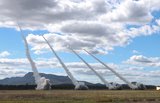DSA 2022: PAL Aerospace and Thales agree to co-develop maritime multimission system
Screenshots of the AMASCOS system in action. (Photo: Thales)
PAL Aerospace and Thales used the Defence Services Asia (DSA) 2022 exhibition in Kuala Lumpur to sign a strategic agreement to co-develop a next-generation system for airborne maritime patrol missions.
The agreement ‘leverages decades of diverse special mission solutions to co-develop mission-ready capabilities’, Thales noted in a 30 March statement.
According to Thales, the targeted capabilities for the next-generation AMASCOS system include machine learning; computer vision; systems support for UAVs and optionally piloted aircraft; underwater warfare defence; and integration of space-based data into a complete mission lifecycle for dissemination in a common operating picture.
These capabilities will be developed jointly by PAL Aerospace and Thales at their respective facilities in Canada, France and the UAE.
More from Digital Battlespace
-
![Australia looks towards space with force restructure, investment and training]()
Australia looks towards space with force restructure, investment and training
Australia is looking to improve its presence in space with a focus on communications and creating a dedicated segment of its defence forces committed to the domain.
-
![EID to unveil new vehicle communication system at DSEI]()
EID to unveil new vehicle communication system at DSEI
The Portuguese company’s naval communications system is in service across more than a dozen countries. It has turned to its home nation for support in developing a new vehicle based C2 system.
-
![Chess Dynamics successfully demonstrates Vision4ce AI-driven tracker]()
Chess Dynamics successfully demonstrates Vision4ce AI-driven tracker
The Vision4ce Deep Embedded Feature Tracking (DEFT) technology software is designed to process video and images by blending traditional computer vision with artificial intelligence (AI) algorithms to present actionable information from complex environments.
-
![Wave Relay devices cleared for security use on commercial systems in industry trend]()
Wave Relay devices cleared for security use on commercial systems in industry trend
Persistent Systems has been cleared by National Security Agency (NSA) to transmit sensitive data on commercial networks. The devices are added to the NSA’s Commercial Solutions for Classified (CSfC) component list which also includes other companies’ products providing the same security.
-
![UK teases cyber spending boost in Strategic Defence Review ahead of “imminent” release]()
UK teases cyber spending boost in Strategic Defence Review ahead of “imminent” release
The release of the UK’s Strategic Defence Review (SDR) has been long promised as mid-year. It is possible it could be as early as 2 June although the UK Ministry of Defence (MoD) continues to play its cards close to its chest.
-
![Intelsat emphasises SATCOM resilience for SOF in contested domains (video)]()
Intelsat emphasises SATCOM resilience for SOF in contested domains (video)
Intelsat outlines how its multi-orbit SATCOM architecture is enhancing connectivity and resilience for special operations forces operating in degraded and contested environments.
























